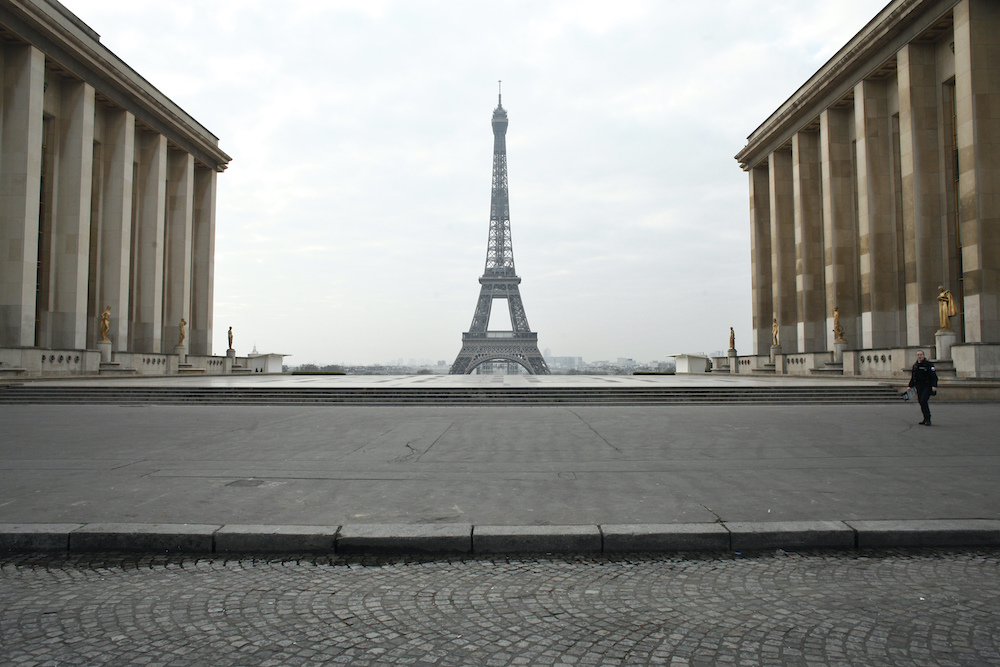
A police officer walks in the empty Trocadéro square, in Paris in March 2020. France is under lockdown due to the coronavirus
Consider this thought experiment:
The problem of _____ [insert problem] will cause major upheavals in life as we know it and possibly extensive deaths in _____ [insert amount of time].
What is the difference between filling in the blanks with “coronavirus pandemic” and “a few days,” versus “climate change” and “a few decades”?
Both statements can be supported with scientific studies, public opinion polls, and direct personal experience. The puzzle is why communities have absorbed one pile of information about an incoming threat and taken action, while a more comprehensively studied and considerably larger but different threat remains mired in political limbo.
Journalists can take some credit for keeping the coronavirus outbreak in the public decision space, when many world leaders insisted the world could carry on as normal. We have had considerably less success drawing attention to climate change challenges. By almost any measure, the threats may be near to or even equivalent in death tolls, economic upheaval, and social disruption. The only difference may be time, days versus decades.
As a Nieman Science Journalism Fellow, I have spent much of the past year asking really smart people why climate change has found itself in such a backwater of public interest and political action. We consider how good scientists often make lousy storytellers, trapped by their continuums of probable outcome and dedication to data, not policymaking. We’ve explored the array of vested interests who stand to profit if the public remains anesthetized and happy with its fossil fuel-based conveniences. We’ve pondered our audiences’ capacity for bad news: Does calling it a “climate emergency,” as The Guardian has opted to do, actually drive people away instead of calling them to action?
As this 2019 Pew global survey shows, a majority of United States citizens share the overwhelming scientific consensus that climate change is a major threat to their nation. But the crucial majority of their elected representatives in Congress and the White House have either refused to act or actively moved in the opposite direction, as President Trump did in pulling out of the Paris Climate Accord and revoking California’s ability to set automobile greenhouse gas pollution standards.
But a growing body of evidence indicates threats like the coronavirus pandemic stem from global warming disruptions and are exacerbated by climate change. Journalists who see the news value of the fast-moving story don’t have to look hard for equal value in the more deliberate-paced menaces.
For example, while there’s no proven direct link between air pollution and Covid-19, Dr. Aaron Bernstein, interim director of the Center for Climate, Health, and the Global Environment at Harvard’s T.H. Chan School of Public Health, observed that lots of research shows how microscopic particulates from fuel burning, forest fires, and other sources can aggravate respiratory diseases. Other studies suggest the spread of insect-borne diseases like Eastern equine encephalitis, which interrupted school sports events and other outdoor recreation throughout New England during the fall of 2019, is driven by climate change.
Journalism’s public service role must be considered in long-term as well as fast-moving events. We’ve been running articles on “Things you can do to save the planet” for years, but few have had comparable effect to the number of people you now hear mumbling the “Happy Birthday” song twice to themselves as they wash their hands in public bathrooms.
Ironically, the travel restrictions imposed to slow coronavirus spread may produce a noticeable reduction in greenhouse gas emissions from international air travel – one of the top personal sacrifices recommended by climate-change activists as a way to reduce atmospheric warming.
The fact remains that whether we cover them or not, planetary forces have been unleashed that will change life as we know it, rattle our economies, and kill many of us. Coronavirus had killed more than 15,000 people worldwide by March 23. The World Health Organization estimates that global warming contributes to some 150,000 deaths a year. Climate-related extreme drought in Syria has been widely cited as the trigger for civil war there, resulting in an estimated 511,000 deaths as of 2018.
These crises come at a time when journalism itself struggles to field enough reporters just to cover the press conferences. Whose newsroom still has a dedicated health or science reporter? Whose contact list includes an epidemiologist, a climatologist, or even the direct line to the local public health director? Who has the math skills to explain what an “exponential increase” in cases means, let alone how paralyzing the American economy and social life might be a good thing? Whether the challenge is overwhelming hospital staffs with disease victims or moving major population centers before sea levels rise, we have to expand our sources and our skills to help our audiences.
Websites such as Science-Based Medicine or STAT, owned by Boston Globe Media, provide excellent coverage on medical issues, including invaluable context for coronavirus. Similar resources exist for climate change, including Skeptical Science, the Intergovernmental Panel on Climate Change, and C2ES (formerly the Pew Center on Global Climate Change).
We also have to confront our own evolutionary biases – that humans are hardwired to discount threats occurring over decades in favor of those that happen in days. If we want to survive long-term, we have to think long-term.
One thing that did make a difference in turning the coronavirus story around was the constant scrutiny of world leaders’ positions on the crisis compared to the evidence world scientists and crisis managers presented. From the Wuhan whistleblowers Ai Fen and Li Wenliang bucking Chinese government censorship on coronavirus spread back in December to PBS NewsHour reporter Yamiche Alcindor’s “nasty question” to Trump about his dismantling of the National Security Council’s pandemic response team, public accountability forced leaders to act.
When the coronavirus crisis has passed, we will still face an even bigger health crisis—climate change. The public deserves the same relentless accountability reporting on that global threat as well.


